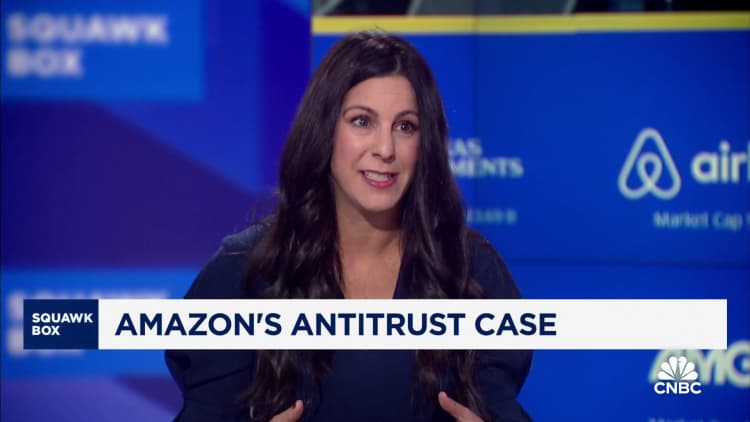Thrasio, an early leader in the big business of Amazon aggregators, had a booth at the popular Prosper Show for Amazon sellers in Las Vegas, Nevada, on July 14, 2021.
Katie Schoolov
Thrasio, the top aggregator of Amazon third-party sellers, is losing its CEO and five other senior executives, months after the former highflier filed for bankruptcy.
Greg Greeley, Thrasio’s CEO, informed staff on Tuesday that he plans to resign, according to an internal memo viewed by CNBC. Finance Chief Josh Burke is also leaving, along with the company’s technology chief, head of human relations, chief commercial officer and supply chain lead.
Stephanie Fox, Thrasio’s chief operating officer, will replace Greeley as CEO. The executives will stay on to ensure a “smooth transition” and then “step down when Thrasio emerges from Chapter 11 in the coming weeks,” Greeley wrote in the memo.
Thrasio became an early leader in what became a rapidly booming market to acquire successful brands on Amazon and combine them under one roof, with the goal of using their data and operational expertise to turbocharge sales. Thrasio raised $3.4 billion in equity and debt from major firms like Goldman Sachs, Blackrock and JPMorgan Chase, and reportedly reached a peak valuation of about $10 billion in 2021.
Thrasio ranked 22nd on CNBC’s Disruptor 50 list in 2021 and 40th the following year. The company snapped up more than 200 brands, from a top-selling pet deodorizer spray, to golf putting mats and cocktail shakers.ÂÂ

But cracks in the market began to form as the pandemic e-commerce surge faded, unsold inventory piled up and some aggregators took on excessive amounts of debt. Thrasio filed for bankruptcy in February and said it had agreed with lenders to restructure some of its debt load.
Alongside the C-suite shakeup, Thrasio is also laying off “employees at every level,” according to the memo. The company declined to say what percentage of its workforce would be affected by the cuts. Thrasio had 1,211 employees as of 2022, according to Pitchbook.
‘Need to slim down further’
“The predicted revenue trajectory from the brands in our portfolio does not support our current operating expenses and future interest payments,” Greeley wrote in the memo. “So just as we’ve restructured our debt to pave the way to profitability, we also need to slim down further to ensure Thrasio can meet its financial obligations and serve customers effectively in the future.”
The company is also considering selling off some of its smaller or more complex brands, according to a source familiar with the matter, who requested anonymity to discuss private matters.
In a court filing, Thrasio said it had between $1 billion and $10 billion in assets, and between $500 million and $1 billion in liabilities. It owes more than $5 million to U.S. Customs and Border Protection and roughly $2.9 million to GXO Logistics, among other liabilities. Greeley said the company’s operations were “cash flow positive in Q1.”
Thrasio’s ability to emerge from bankruptcy could be complicated by an ongoing investigation by the Unsecured Creditors Committee, which seeks to determine “how the debtors lost over $3 billion in value in less than two years,” according to a separate filing with the bankruptcy court last week.
The creditors have requested more information about a “2020 insider tender offer, which resulted in millions of estate funds being transferred to insiders,” as well as potential conflicts of interest with the retiring of a loan. They’re also inquiring about officers and directors involved in over $300 million in company stock sales “that has given rise to allegations of fraud.”
Thrasio previously overhauled its leadership ranks in 2021, when co-founder Josh Silberstein resigned from his role. The company laid off about 20% of its employees the next year.
Greeley, a 19-year veteran of Amazon who oversaw the development of the Prime loyalty program, was named CEO in 2022, joining along with a slate of executives who had experience at Walmart and Amazon, to try and orchestrate a turnaround.
WATCH: Amazon not only customer-obsessed but also competitor-obsessed

Read the original article here


